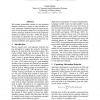Free Online Productivity Tools
i2Speak
i2Symbol
i2OCR
iTex2Img
iWeb2Print
iWeb2Shot
i2Type
iPdf2Split
iPdf2Merge
i2Bopomofo
i2Arabic
i2Style
i2Image
i2PDF
iLatex2Rtf
Sci2ools
103
click to vote
COLING
2002
2002
Probabilistic Models of Verb-Argument Structure
We evaluate probabilistic models of verb argument structure trained on a corpus of verbs and their syntactic arguments. Models designed to represent patterns of verb alternation behavior are compared with generic clustering models in terms of the perplexity assigned to held-out test data. While the specialized models of alternation do not perform as well, closer examination reveals alternation behavior represented implicitly in the generic models.
Alternation Behavior | COLING 2002 | COLING 2008 | Generic Clustering Models | Probabilistic Models |
Related Content
| Added | 17 Dec 2010 |
| Updated | 17 Dec 2010 |
| Type | Journal |
| Year | 2002 |
| Where | COLING |
| Authors | Daniel Gildea |
Comments (0)

